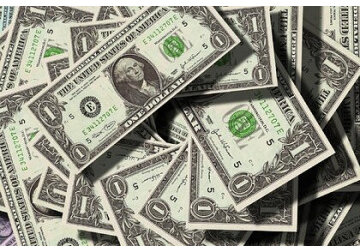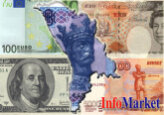
Moldova's foreign currency reserves, after a significant decline, may still be slightly reduced in a short period of time, but in a few months they will quickly recover, thanks to external support - IDIS Viitorul.
This opinion was expressed by an expert on economic policy of the Institute for Development and Social Initiatives Veaceslav Ionita. He recalled that in October 2021, the official reserve assets of the National Bank of Moldova reached a historical maximum of $4 billion 073 million. To date, they have decreased by $652 million - to $3 billion 421 million, and this is the fourth significant reduction in foreign currency reserves in the history of the country since gaining independence. According to the expert, the NBM began interventions in the foreign currency market in March 2021, but these interventions were minimal, until October 2021 they amounted to only $37 million in sales. In the next 4 months - from November 2021 to February 2022 - interventions were extremely high, at $479 million, and in March, interventions are expected to be at least $200-250 million, which means total sales of about $750 million. Veaceslav Ionita stated that there are four main factors that determined the intervention of the NBM. First of all, we are talking about the energy crisis and the unprecedented rise in import prices for natural gas. Due to the increase in natural gas prices, Moldova has to pay about $480 million for natural gas in Q4 2021 and Q1 2022, which is 4 times more than in the same period of 2020-2021, when was paid $118 million. To reduce the social and economic impact, the government intervened with direct payments to the energy sector, as well as compensation to the population. All this money ended up in the foreign exchange market, and the NBM had to intervene to reduce the negative impact caused by a sharp increase in the purchase price of natural gas. It is estimated that this factor contributed to the reduction of Moldova's foreign currency reserves by $250-300 million. The second factor, according to Veaceslav Ionita, was the panic caused by the war in Ukraine, which led to massive purchases of foreign currency by citizens and business entities. The panic began on February 24 and over the next 5 days, unusually large purchases of foreign currency by the population in the amount of about $100 million were noted. The panic lasted about 3 weeks, and it is estimated that the NBM sold about $250 million to reduce the negative impact of the panic. “Our citizens are also panicking in much simpler cases, like before the 2019 elections, when the NBM sold $273 million to calm the market. But, as I said, the panic does not last long, and citizens quickly return to normal and bring the currency back to the market,” said Veaceslav Ionita. In his opinion, the third factor of influence was the excessive consumption of the population in 2021, based on lending and the NBM's fight against imported inflation. The expert pointed out that consumer lending grew unprecedentedly in 2021, most of which entered the foreign exchange market. Herewith, in Moldova in 2021, the inflation rate was almost 14% per year, which is the highest rate in the last 20 years. In order to reduce the negative impact on the foreign currency market due to credit consumption, as well as reduce the impact of imported inflation, in March 2021, the NBM began to carry out small interventions in the foreign exchange market. Thus, it ensured the stability of the exchange rate. Moreover, farmers are now officially calling on the NBM to intervene in the foreign exchange market in order to strengthen the leu and reduce the unprecedented rise in prices for fertilizers and oil products, since the exchange rate directly affects the price of imported products in lei. It is estimated that about $100 million was used by the NBM to fight price increases caused by imported inflation. “The NBM sold at least $750 million, while foreign currency reserves decreased by $652 million. How is this possible? There should be an answer to the question: did we have a decrease in foreign currency reserves? Oddly enough, the answer to this question is not as simple as it seems at first glance. As already mentioned, the NBM began interventions in the foreign exchange market in March 2021, when the country's foreign currency reserves amounted to $3 billion 764 million. Since then, the NBM has sold at least $750 million, and foreign currency reserves have decreased by only $343 million. A natural question arises: a where else were at least another $400 million taken? And this is the fourth factor that reduced the negative impact of the energy crisis, the panic caused by the war in Ukraine and the unprecedented rise in prices over the past 20 years,” the economist said. According to him, the fourth factor that helped Moldova during this period was the help of external partners. Money from the IMF in the form of loans and the European Commission in the form of grants lessened the impact of the crisis. In fact, out of the total amount of interventions in the amount of at least $750 million, the NBM contributed 40-45% of its own reserves. According to Veaceslav Ionita, the energy crisis will continue in the coming months, but its intensity as the maximum possible has already been exceeded. For this reason, the pressure of energy prices on the foreign exchange market will be incomparably lower than in the last 5 months. The panic caused by the war in Ukraine has ended, the population has returned to normal, and even citizens are expected to sell foreign currency. The price problem in 2022 will be even more acute than in 2021. The NBM will have to intervene to protect citizens, but this intervention will be several times less than the intervention caused by the energy crisis and panic in February. External partners will increase assistance to Moldova, which will allow to restore and even increase official reserve assets above the level of March 2021. “A slight decrease in official reserve assets is possible in a very short period of time. But in a few months, thanks to external assistance, they will quickly recover. Finally, let's not forget that foreign currency reserves, called reserves for this purpose, should be used in such times of crisis. The good part is that we have external partners, especially the EU and Romania. With their support, we will be able to restore the reserves allocated during the crisis in a few months,” the expert concluded. // 28.03.2022 — InfoMarket







